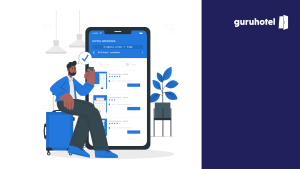Customer service is not only a process that occurs while your customers are physically in your hotel; It is also essential before and after your visit, even without the need for a person to intervene. As buyers, something that always makes us feel comfortable is the warmth with which we are served, as well as the speed and efficiency with which our doubts are resolved. In the digital age, on the one hand, the customer has achieved more autonomy when buying online, but there are many companies that forget the need for contact or dialogue between customers and staff.
How to deal with slow or inefficient communication channels?
Let's put it like this: you want to take a trip with your family. After searching among several options, you find the hotel that you like the most, but on its website there is no information about whether the rooms are equipped for people with disabilities, so you decide to contact us for a more personalized attention. You have at your disposal:
- A phone number
- A mail
Given your haste to make your reservation, you opt for the fastest option, according to your criteria: call by phone. Bad idea. After 10 minutes, the only thing you accomplished was learning the tune of the hold music. Option B: Facebook should work safely. You write to the hotel via Messenger. Nothing. So, more resigned than eager, you see 2 more options:
- Find another hotel
- Contact via email You opt for the second option. Congratulations! You have unlocked the persistent client level. After 3 hours, you receive a reply. They have been able to solve your question, but… for that you used 3 contact attempts, and a lot of time.
Have you experienced this or a similar situation? If so, you will understand how frustrating it can be for a customer to deal with a poor communication channel; The negative impact that your hotel could have is also evident, because not only do you run the risk of losing customers, but also you risk bad recommendations or evaluations by users.
Many times, companies are not aware of the “behind the scenes” of their customers. Therefore, there are no improvements in your care. It is a bad belief to think that, in these specific cases, a human will be more efficient than a bot. In fact, it is possible to take advantage of both to create a much more effective, faster and automated communication channel together.
One step beyond customer service
Chatbots, robots that respond like people, or telemarketers-robots, are increasingly used in the tourism industry to start a conversation with potential customers, guide them in their purchases and solve their frequent doubts. Aeromexico currently uses this tool. On his Facebook Messenger you can see a message like this: Hello! I am Aerobot and I will help you with the planning of your trip. By clicking on start you accept our privacy notice: https://goo.gl/9DznDs 👇🏼.
Next, the wizard displays various options and, according to what you want, more branches are opened. If you click on the option "I have a question", Aerobot will answer: Write your question in one line. For example: How to invoice?
In this way, it does not matter what time you decide to start a conversation: the online advice will be immediate and, depending on how the chatbot is programmed, it will try to cover your queries.
Hotels like Marriott and Hilton have implemented this technology in their mobile apps, and just as Aeromexico has Aerobot, Lufthansa airline also has Mildred, its Messenger chatbot. There is also the hotel chain Starwood Hotels & Resorts, which has a similar service through WhatsApp, called Let's chat.
Join the conversational commerce!
The formula: AI (Artificial Intelligence) + People = better service, more sales and greater satisfaction. Just like these large hotel chains and these airlines that we mentioned, if you also decide to join the conversational commerce, the best way to do it is through chatbots and other tools that involve the presence of artificial intelligence, or by integrating channels of personalized communication through WhatsApp, Messenger or others.
In this way, users who visit your hotel website will feel more confident when you automate partially personalized messages, according to the purchase stage they are in, for example:
1.- If they are new to your site and request information, you can implement messages with their name that welcome. 2.- If once the information is obtained, they wish to start with the reservations, the messages may include a text such as "There is only one step left to complete your purchase." 3.- If they decided not to buy, for some reason, the messages could contain "Still not decided? Here are more similar options for your stay!"
The intention is that you achieve fluid communication and as natural as possible with your customers, to facilitate their purchase processes and follow-up. Chatbots can be as complex and complete as you want them to be.
Why are static websites becoming obsolete?
When referring to static websites, we are talking about those that often have incomplete information, are outdated and impersonal, thus forcing travelers to get the answers they are looking for outside of the site, whether by calling, sending an email, or through some other tedious process that can ruin the purchase intention.
If you decide to use conversational commerce strategies, you will see that you will be able to resolve any questions that may arise before, during or after a reservation from the same place. In addition, you can optimize the simultaneous attention for many users, without the need for them to complete thousands of steps. Finally, you will be able to collect valuable information about the shopping experience on your website, to offer better service, according to the needs of your buyers.
If you want your customers to approach you and interact in a more dynamic way, investing in conversational commerce will be an excellent decision. GuruHotel has these conversational commerce tools built in, ideal for your hotel website.








